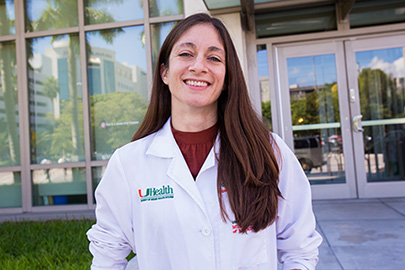By Richard Westlund / Special to UM News
While progress has been made in many areas, many unknowns remain when dealing with Zika.
Christine L. Curry, M.D., Ph.D., assistant professor of obstetrics and gynecology for the University of Miami Health System, was thrust into the national spotlight in 2016 for her leadership in caring for pregnant women infected with Zika.
Today, Curry is still on the frontlines of caring for newly infected pregnant women as co-director of UM’s Zika Response Team, while collaborating on important data-gathering and research studies to monitor the infants.
“From a clinical perspective, we have made significant progress,” said Curry, who has a background in virology. “Pregnant women now know that they have the right to free testing. Also test results are coming back much more quickly for patients seen at UHealth clinics and our affiliate Jackson Memorial Hospital. That’s important because it’s hard to counsel women when you don’t know if they were infected or not.”

Christine L. Curry, M.D., Ph.D., assistant professor of obstetrics and gynecology, is treating and counseling women infected with Zika.
The CDC now recommends pregnant women be screened for Zika at least once every trimester.
“Along with receiving prenatal care, it’s important for Zika-positive mothers to deliver at a location where their babies can receive comprehensive care in their first days of life,” Curry said. “We also stay in close touch with these new mothers, even if their babies do not have any evident problems.”
In 2016, UHealth and Jackson identified more than 50 babies born to mothers with confirmed Zika infections. The percentage of infections was highest in Haitian-Creole and Spanish-speaking mothers, pointing to health disparities in the South Florida community. Because so many Miami-Dade residents travel to and from the Caribbean and Latin America, clinicians no longer ask whether the mothers acquired the infection locally or during a visit to another country, Curry added.

Audina M. Berrocal, M.D., professor of clinical ophthalmology at UM’s Bascom Palmer Eye Institute
New information from the U.S. Centers for Disease Control and Prevention (CDC) Zika registry is providing a better idea of the risks. “It now appears that only about 10 percent to 20 percent of infected mothers pass the Zika virus to the fetus,” Curry said, adding that only 1 in 20 infected babies show immediate effects from Zika.

Claudia A. Martinez, M.D., associate professor of medicine at the University of Miami Miller School of Medicine
Vision problems are part of the damaging cluster of medical issues affecting these infants. Audina M. Berrocal, M.D., professor of clinical ophthalmology at UM’s Bascom Palmer Eye Institute, and Camila V. Ventura, M.D., a former pediatric retina research fellow at Bascom Palmer, collaborated on a study of 32 Brazilian infants who tested positive for Zika infection. Visual impairment was detected in all 32 babies, and retinal or optic nerve problems were observed in 14 patients.
Zika may also cause cardiac problems, and Claudia A. Martinez, M.D., associate professor of medicine, is leading a state-funded study of adult, non-pregnant Zika patients to determine if Zika increases the risk.
Other pediatric specialists with the Zika Response Team are studying Zika’s potential impact on hearing and are rigorously screening asymptomatic newborns to identify blood markers or other subtle indicators of Zika’s impact.
Share this Post

